
Donald Trump speaking at Conservative Political Action Conference (Photo Credit: Gage Skidmore, CC 2.0).
When the Environmental Protection Agency released an initial draft finding in late April that glyphosate – the herbicide in Roundup, one of the most popular weedkillers in the world – was safe, it was the product of years of study from the EPA. It was also a thoroughly unsurprising ruling, as the Trump Administration’s regulatory agencies have long made clear that their priority is protecting the profits and interests of the country’s largest and most powerful corporations.
Roundup’s safety remains an open question, with regulatory agencies in the European Union far more concerned about the danger of the product than their American counterparts. Nevertheless, the EPA is firmly committed to the proposition that Roundup is safe if used as directed.
Now, internal Monsanto e-mails, reports and other documents – filed as part of an ongoing lawsuit in Alameda County, California – details just how strong the support from the Trump Administration has been. The documents reveal a strong connection between the White House and Monsanto and a company that treated support from the federal government as a given.
The Context for the Documents
Monsanto was recently purchased by Bayer, a German industrial giant best-known in the US for its pharmaceutical products. Monsanto and Bayer are currently attempting to weather a bevvy of lawsuits from individuals and their families who allege that long-term exposure to Roundup has caused serious health problems, including non-Hodgkin lymphoma.
A married couple, Alva and Alberta Pilliod, filed such a suit in Oakland, California. The Pilliods are both suffering from non-Hodgkin lymphoma and allege that their decades of exposure to Roundup caused their cancer.
Lawyers for Monsanto attempted to bring the EPA’s recent finding to the attention of jurors. In response, the Pilliods’ attorneys submitted the internal Monsanto documents, saying that they “speak directly to the credibility” of the EPA’s report.
“We Have Monsanto’s Back”
The key document in the trove submitted by the Pilliods’ lawyers is a report from an intelligence firm called Hakluyt, whose website is conspicuously light on actual information about what the company does. The report, written for a senior Monsanto official, lays out Hakluyt’s appraisal of the political and regulatory environment around glyphosate.
As detailed in a story by the nonprofit research group, U.S. Right To Know (linked above), the Hakluyt report quotes a White House policy adviser as saying, “We have Monsanto’s back on pesticides regulation. We are prepared to go toe-to-toe on any disputes they may have with…the EU. Monsanto need not fear any additional regulation from this administration.”
The report says that the EPA and the US Department of Agriculture both believe the research categorizing glyphosate as a probable human carcinogen is deeply flawed. “There is little doubt that the EPA supports the use of glyphosate,” according to the report.
However, the report also chronicles a schism between political leadership at the administration’s regulatory agencies and professional staffers who work at the agencies over the course of multiple administrations. This is also not an unusual development – career staff at the EPA objected to a new rule on asbestos, for example.
Hakluyt reported that career staffers at agencies throughout the federal government often disagreed with their political superiors on a range of regulatory and environmental issues, with the EPA the best example of this dynamic. The report says that leadership at the EPA was “averse” to a theoretical risk analysis of glyphosate and claims there exists a strong difference of opinion on glyphosate between career staffers and political leadership.
None of this is particularly surprising – we have long understood that the political leadership in the Trump Administration’s regulatory agencies was committed to an extreme de-regulatory agenda that often conflicted with the scientific assessments of career staffers. However, there is value to seeing these dynamics laid out in black and white.
The Monsanto documents speak to the importance of legal action in holding companies like Monsanto accountable for their actions – not just for the sake of the plaintiffs involved, but for the larger cause of transparency. These sorts of claims have a way of uncovering damning and embarrassing information that powerful defendants would prefer to keep quiet.
Jurors are currently deliberating in the Pilliod trial. Regardless of the verdict they hand down, the trial has already revealed information of clear interest to the broader public.




Just like the Special Prosecutor regulations allow him to break with the Attorney General and report to Congress to shed public light on a malignant President, Monsanto and Bayer must fully disclose their company’s dark secrets, as publically-traded companies